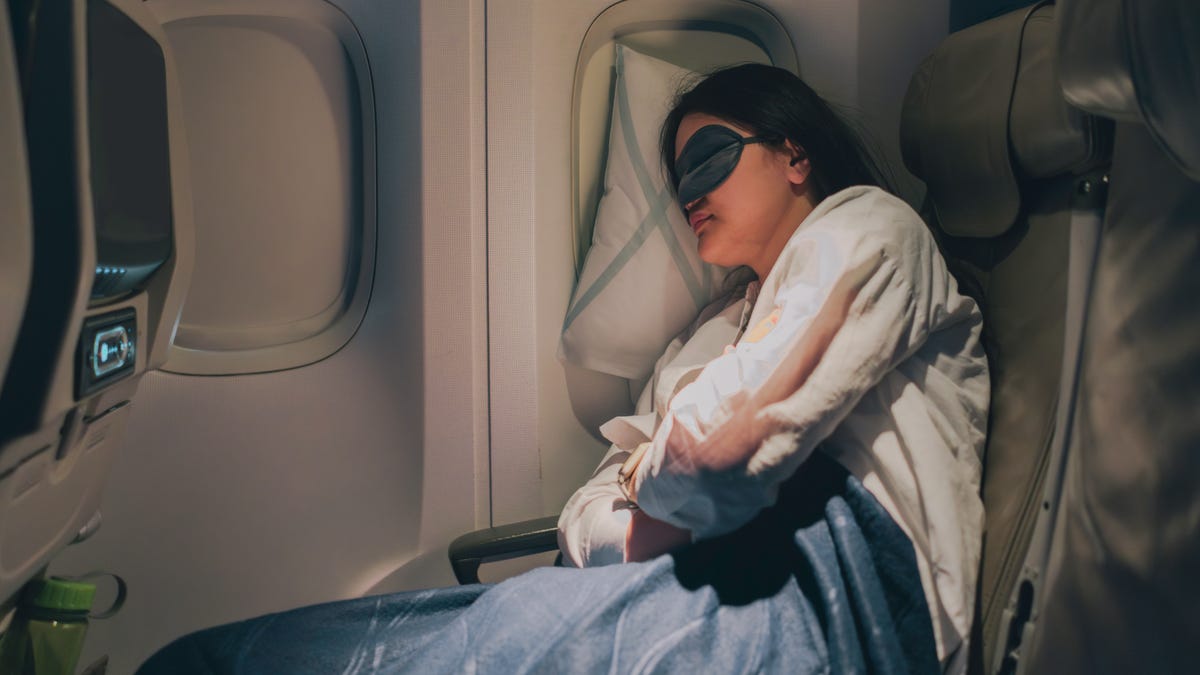 Why You Can Trust CNET
Why You Can Trust CNET Adiós, Jet Lag: Sleep Better While Traveling With These 7 Tips
Taking a trip this spring? Here are simple ways to protect your sleep from time zone changes.

Traveling across multiple time zones can affect your sleep patterns.
It's no secret that going on a trip can disrupt your sleep patterns. Problems can multiply if you travel long distances across multiple time zones, often resulting in jet lag.
Jet lag isn't just a made-up term frequent flyers use to describe being tired. It's a real thing. The circadian rhythm is our internal clock, and it helps regulate when we should go to sleep and wake up. Changing your time zone affects the time you go to bed, and your body can become out of sync. According to the Mayo Clinic, common jet lag symptoms include:
- Fatigue
- Trouble falling asleep
- Headaches
- Difficulty concentrating
- Lack of appetite
- Stomach problems
- Mood changes
Don't let jet lag ruin your travel plans. I've pulled together a list of tips to help you adjust to the new time zone quicker and save your sleep quality.
7 tips for combating jet lag
1. Start prepping before your trip
Making slight adjustments before entering the new time zone can lessen jet lag symptoms. To do this, you can gradually change your circadian rhythm to the new time zone by shifting the time you go to sleep and wake up. Typically, you want the changes to be minor, around 30 minutes at a time. Doing this the week leading up to your trip can help you bounce back quicker.
2. Live like the locals
When you change time zones, you want to adapt your activities as quickly as possible. Forget your old time zone; it means nothing to you now. That means eating and sleeping when you would normally, according to the new time zone, even if you wouldn't usually sleep for another three hours. If possible, it's also good practice to time your meals with local mealtimes.
Before taking off, act like you are already there. Set your watch to the correct time and sleep when you can. If you're flying when you would be sleeping at your destination, try sleeping on the plane to avoid jet lag. Small changes in advance will make the later ones less drastic.
Read more: Best Headphones for Sleeping
3. Hang out in the sunshine
Light is one of the most important ways your circadian rhythm determines when you fall asleep and wake up. As it gets dark, our bodies release melatonin to prepare for sleep. Spending time in the sun will help your body adjust to the new time zone by halting the natural release of melatonin. If you arrive at your destination during the day, don't immediately duck into your hotel room -- hang outside for a few hours and soak up the sun.
Additionally, you can use sleep tech to help. Sleep masks like Lumos can help you gradually adjust your internal clock during travel times. It's a little pricey at $298, but when CNET tested the Lumos sleep mask, we found it did help significantly.
4. Make sure the room is ready for sleep
Sleeping in a new space can be challenging. To combat this, make sure the room you're sleeping in -- whether a hotel room or the spare bedroom of your grandmother's house -- is conducive to sleep.
Ways to make sleeping when traveling easy:
- Set the thermostat to a cool temperature to keep things comfortable all night. The best temperature for sleep is between 60 and 67 degrees Fahrenheit.
- Pack items from home to make it more familiar -- a blanket, a white noise machine or your favorite pajamas.
- Try using a sleep mask to block out any light in the room.
- Make sure you're sleeping on a comfortable mattress that suits your sleeping position and body type.
5. Avoid drinking caffeine (and alcohol)
The instinct is to reach for a cup of coffee to keep you going through the fog of jet lag, but it can actually make the situation worse. It's not that you can't drink it; you just need to be strategic about timing. If you arrive at your destination in the evening, drinking coffee or soda will make sleeping harder if it's too close to bedtime. Avoid caffeinated drinks and alcohol a few hours before bed. Substitute those beverages with water to ensure you're hydrated as dehydration can exacerbate the symptoms of jet lag.
6. Try melatonin
Our bodies naturally produce melatonin to help regulate our circadian rhythm. As the sun goes down, our body is flooded with melatonin, which makes us sleepy. Melatonin supplements can help you fall asleep more easily by jump-starting that process. Regarding dosage, 0.5mg is typically considered a lower dose, while 5mg is on the higher side.
7. Take a warm shower or bath
After taking melatonin, jump in the shower or soak in the tub to relax. Research suggests that taking a shower or bath can help you fall asleep faster. As you cycle through the stages of sleep, your body temperature naturally fluctuates a couple of degrees. Bathing helps that process along by cooling your body temperature. But not just any shower will do; you should aim for warm water about an hour and a half before bed.

